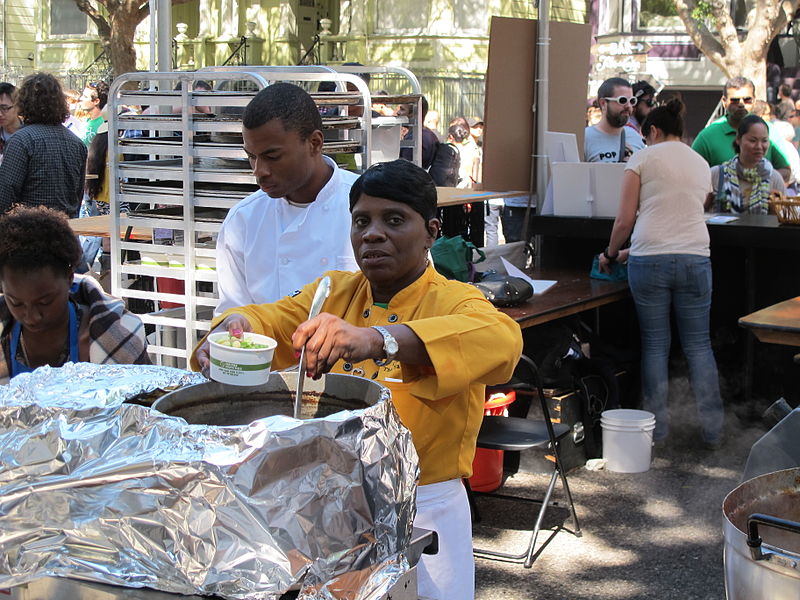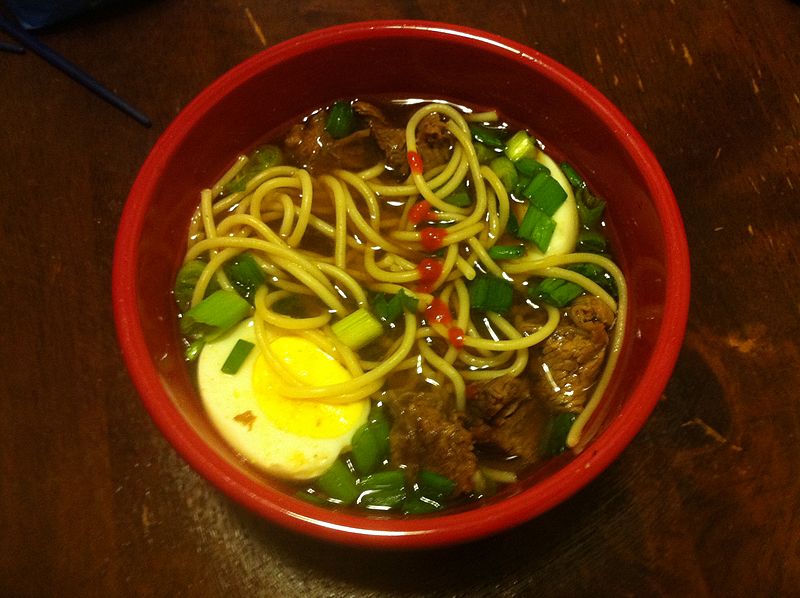
Miss Linda doles out another bowl of Yakamein, five hours into the 4th Annual San Francisco Street Food Festival (Photo: Gary Stevens)
If you’re eating your yakamein with a spoon, you’re doing it wrong. At least, that’s according to one of the city’s foremost experts and purveyors of the indigenous New Orleans soup.
“I tell them you eat it with a fork and then you drink the juice,” says Linda Green, aka ‘The Yakamein Lady.’
While a typical yakamein includes noodles – that’s the ‘mein,’ some kind of meat, a hard-boiled egg, and green onions, “it’s really, really all about the juice,” or broth, Green says.
That “juice” is a secret family recipe that goes back generations. Green’s grandmother, Georgie, used to cook yakamein in her home on Oretha Castle Haley Boulevard, which smelled so good that people from the neighborhood would show up on her porch with a bowl…and an appetite. “As soon as she’d get through, my auntie and her and a whole bunch of other people would come in and help feed everybody and everybody sittin’ on the porch and just shoot the breeze; they called it ‘porch poppin’.”
Green’s mother then began selling yakamein out of a nearby bar. And after Hurricane Katrina prematurely ended Linda’s job as a school cafeteria worker, it ended up being her time to carry on the family tradition.
She began serving her family’s yakamein to the recovering city’s struggling musicians through Tipitina’s. Pretty soon, “I had lines around the block,” says Green.
Since then, “I just went out on faith and never looked back.”

Yakamein, aka ‘old sober’ (Photo: Wiki Commons)
While Green’s family history in the yakamein game is well known, the overall history of the soup is a little murkier. She says one theory is that black G.I.’s in Korea began cooking the dish and brought it back to New Orleans, where African-Americans “elevated it with their spices and herbs and brought it to another level,” Green says.
Yakamein also provides relief from a common New Orleans affliction – as evidenced by its nickname, ‘Old Sober’ – it’s great for hangovers. “Scientists in California said it’s the egg,” says Green. Similarly, it also provides relief from your garden variety cold. “It coats your insides. I’ve had plenty of people call me up [and say] I’m sick, I’ve got a cold, I need it.’”
While Green says that traditionally yakamein was thought of as “a poor man’s dish” or a “leftover dish” made from the leftover pork chop or roast from Sunday dinner, it’s now emerging into a larger spotlight. “I’ve been so consistent and persistent with it, so it’s becoming famous all over now,” she says.
Yakamein and Green were recently featured on both the BBC and they earned the endorsement of the late chef/writer/television host Anthony Bourdain.
“He told me he’d been all over the world,” she says, but he’d “never tasted that flavor before.” Bourdain also suggested that Green copyright her family recipe, which she did.
Green is also becoming a fixture at local festivals, including Jazzfest, French Quarter Fest, Po-Boy Festival, and Gumbo Festival. “I do them all,” says Green. “I love them all.”
 NOLAbeings
Multimedia artist Claire Bangser created NOLAbeings as a portrait-based story project that marries...
NOLAbeings
Multimedia artist Claire Bangser created NOLAbeings as a portrait-based story project that marries...
 Data corner: Adobe Suite (create a PDF, social media graphic, presentation, edit a photo and video
Data corner is where you go to work with analytics and top tech skills. It takes on everything from PERL and SQL to Canva and Sprout Social.
Data corner: Adobe Suite (create a PDF, social media graphic, presentation, edit a photo and video
Data corner is where you go to work with analytics and top tech skills. It takes on everything from PERL and SQL to Canva and Sprout Social.
